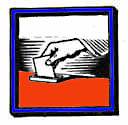|
NewsHour
Extra: Hey,
I'm not finished yet: video
Teens
from New Jersey, Colorado and Virginia talk about the issues they care
about.
Private
school boyz:
What is it like to go to high school where Bush and Gore went?t. Is
the system broken? A look at why many Americans feel left out of
the political process. Outside
Links:
|
This Is So Confusing November
7 is over, but where’s the new More than 100 million Americans cast ballots on Election Day, but at the moment, no one knows who the new president is. That’s because determining the winner involves more than just counting up the votes. Popular but not enough Here’s how the results break down so far. Al Gore received 50,158,094 votes nationwide or 49 percent of the votes. George W. Bush received 49,820,518 votes or 48 percent of the votes. A difference of 337, 576 votes. A real squeakier of win for Al Gore, right? Wrong. The President is actually chosen by the Electoral College, a group made up of representatives from each state. These 538 electors cast the actual votes for president, based on the votes cast in their home state.
So whose idea was it to elect a president this way? – the Founding Fathers. The Electoral College Benjamin Franklin, George Washington, John Quincy Adams and Thomas Jefferson included the Electoral College system in the U.S. Constitution. Each state gets a set number of votes in the electoral college, based on its population. So, for example, Texas has 32 electoral votes but Tennessee, which has fewer residents, only has 11. Most states have a winner-take-all system. That means the candidate who finishes first in the state’s popular vote gets all the electoral votes. Even if the popular vote comes in at 49 to 51 percent, the candidate with the majority gets all the electoral votes. Nebraska and Maine can split their electors.
The point of the electoral college – and the magic 270-vote threshold – is to make sure that states with small populations don’t get ignored. Even if a candidate won California, Texas, Florida and Pennsylvania, the four most populated states, it would only give them 134 electoral votes. To get to 270, a candidate has to win some small states. Some
people are calling for a Constitutional amendment to change this system,
saying the Electoral College is too confusing and indirect. It’s
not fair, they say, if the person who got the most votes doesn’t
automatically win. Let's toss this system out
What do you think? Is the Electoral College system fair? Should we change it? -Updated Dec 6, 2000 |

 president?
president?
 A
presidential candidate needs 270 electoral votes to win the White House.
The results in Florida were so close that a recount is required to figure
out who won. In the meantime, the state’s 25 electoral votes haven’t
been cast. And neither George W. Bush nor Al Gore can reach the magic
number without the 25 electoral votes from the Sunshine State.
A
presidential candidate needs 270 electoral votes to win the White House.
The results in Florida were so close that a recount is required to figure
out who won. In the meantime, the state’s 25 electoral votes haven’t
been cast. And neither George W. Bush nor Al Gore can reach the magic
number without the 25 electoral votes from the Sunshine State. At
the moment Gore has 255 electoral votes and Bush has 246. Whoever wins
Florida gets 25 more, enough to put him over the top.
At
the moment Gore has 255 electoral votes and Bush has 246. Whoever wins
Florida gets 25 more, enough to put him over the top. There
have been three times in U.S. history the candidate who won the popular
vote did not win the Electoral College, and therefore didn’t get
to be president. The 1888 race between Republican Benjamin Harrison
and incumbent Democratic President Grover Cleveland mirrors today’s
situation. When the votes were counted, Cleveland came out ahead by
110,476. But Harrison got the important electoral vote and became the
23rd president.
There
have been three times in U.S. history the candidate who won the popular
vote did not win the Electoral College, and therefore didn’t get
to be president. The 1888 race between Republican Benjamin Harrison
and incumbent Democratic President Grover Cleveland mirrors today’s
situation. When the votes were counted, Cleveland came out ahead by
110,476. But Harrison got the important electoral vote and became the
23rd president.